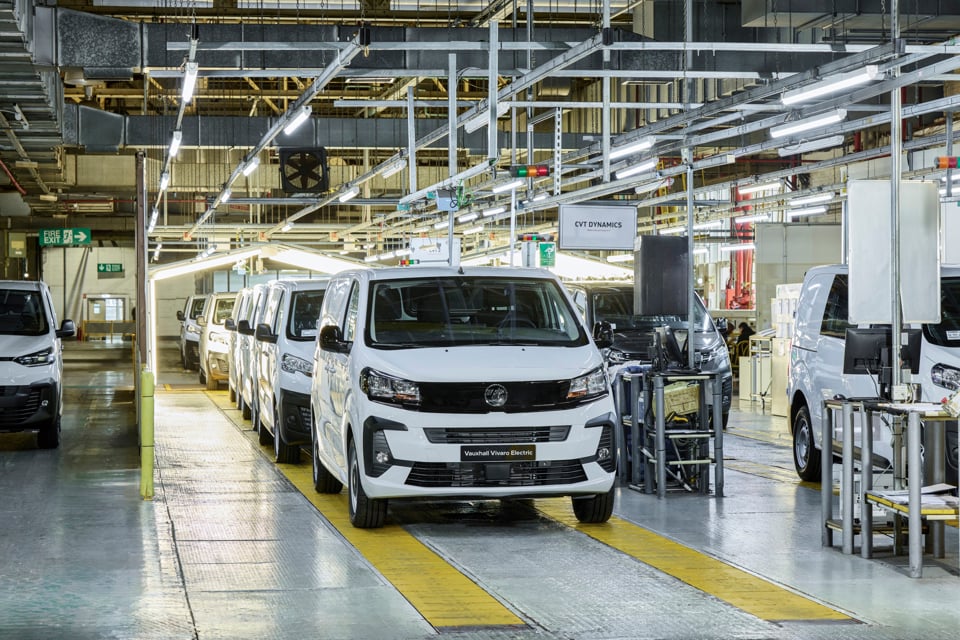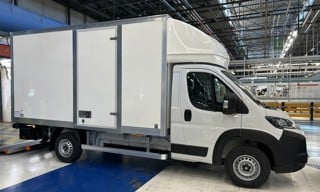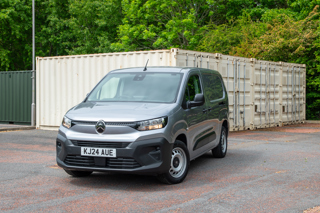Stellantis has announced plans to consolidate its electric van production in the UK at its Ellesmere Port plant, closing its factory in Luton and putting 1,100 jobs at risk.
The owner of four van brands, Vauxhall, Citroen, Peugeot and Fiat, blamed the UK’s zero emission vehicle (ZEV) mandate.
It requires more than a fifth (22%) of cars and 10% of vans sold by manufacturers in the UK to be fully electric vehicles (EVs) this year.
The targets become tougher each year ahead of the 2030 phase out date for petrol and diesel vehicles.
Manufacturers will face fines of £15,000 for each vehicle sold outside the target, but the reality of the targets is not as clear-cut as this, as there are several alternative ways for manufacturers to meet compliance.
Stellantis has started a consultation with its employees and trade unions on the proposal to consolidate its UK manufacturing to its Ellesmere Port site, which includes a further £50 million being spent on the factory in Cheshire.
The manufacturer invested £100m in Ellesmere Port in 2021, to transform the facility to battery-electric light commercial vehicle (LCV) production, making it the first battery electric vehicle-dedicated plant globally for Stellantis.
Today, it is the UK’s first and only volume EV-only manufacturing facility, building the company’s small LCV range of Citroën ë-Berlingo, Vauxhall Combo Electric, Opel Combo Electric, Peugeot E-Partner and Fiat Professional E-Doblo.
In a statement, Stellantis said that it “remains committed to acting responsibly toward its employees in Luton” and, if the company's proposals are approved, will “offer relocation support to facilitate employees wishing to transfer to the Ellesmere Port site, with an attractive package, where hundreds of permanent jobs will be created”.
“Dedicated comprehensive job support, including opportunities for retraining, for all employees affected will also be implemented in the very active Luton area, just one mile from the international airport,” it added.
“At the same time, Stellantis will work with local government and local employers to identify new employment opportunities within the Luton area for Stellantis employees who might be impacted by this proposal if it goes ahead.”
Stellantis says it intends to remain the UK market leader in electric LCVs, with over 32,000 vehicles already sold in the country since launch and will continue to be the only volume manufacturer of LCVs in the UK.
There has been growing disquiet about the pace of change amongst carmakers, with ministers meeting representatives from the auto industry, including Stellantis, for crunch talks last week (Wednesday, November 20).
The Government welcomed the investment in the future of the Ellesmere Port plant, but said it knows this will be a “concerning time for the families of employees at Luton who may be affected”.
Earlier this year, Stellantis announced that its Luton plant would start producing electric vans for Vauxhall, Citroen, Peugeot and Fiat Professional from the first half of 2025.
The Luton plant was expected to produce the fully electric Vauxhall Vivaro Electric, Opel Vivaro Electric, Peugeot E-Expert, Citroen e-Dispatch and Fiat Professional E-Scudo in both right and left-hand drive.
Production of the equivalent internal combustion engine (ICE) vans were also expected to continue alongside the electric versions.
The news from Stellantis comes just days after Ford announced it was cutting 800 jobs in the UK over the next three years, blaming a weaker demand for EVs.
Editor's comment
Fleet News' editor Stephen Briers said:
"In our conversations with Department for Transport policymakers, they have always made crystal clear that no manufacturers will be fined for ‘missing’ the 22% ZEV Mandate targets for cars.
And none would be fined next year for missing the 28% target. Nor would they be fined for mixing the 10% van target (a much more challenging target, too).
So why are manufacturers squirming and why is Stellantis blaming the ZEV Mandate for the closure of Luton.
The latter is simply disingenuous: the ZEV Mandate has nothing to do with the decision; Luton is an ageing and under-invested plant which Stellantis no longer needs from a global production perspective. And when it comes to global decisions, it’s easier to close a plant in the UK than in France or Germany.
The former is about profits and positioning: manufacturers need to squeeze every drop of profit from their petrol and diesel cars to make up for the cost of R&D in electric products which the mass market – certainly the retail mass market – does not want. Not yet, at least.
So any softening of ZEV targets (there won’t be) or additional support to bolster the sales story would be a fillip to ailing profits.
And the Government has succumbed – in part – to sustained lobbying by announcing a so-called ‘fast track consultation’ to consider ways in which it can support (Western) OEMs as the grapple with the ZEV Mandate.
Note Western: Chinese carmakers need no such support; indeed most of them have brushed aside the impact of EU tariffs as a minor inconvenience.
Next year, we’ll see Leapmotor (ironically a Stellantis JV with the Chinese local producer), Changan, XPeng, Skyworth and Omoda premium brand Jaecoo launch in the UK, plus BYD sister marques Yangwang and Denza are on the 2026 horizon. And we expect electric vans to join them too."

























Login to comment
Comments
No comments have been made yet.